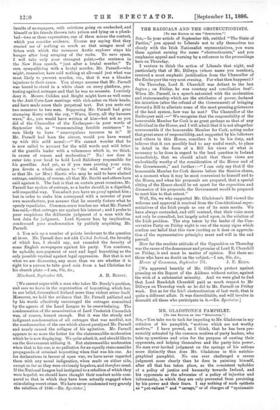THE RADICALS AND THE OBSTRUCTIONISTS.
f To THE EDITOR OF THE " SPECTATOR."
Sia,—In your article of September 4th, entitled "The State of Parties," you appeal to Liberals not to ally themselves too closely with the Irish Nationalist representatives, you warn them against earning the name "obstructionists," and you emphasise appeal and warning by a reference to the proceedings here on Thursday.
I venture to think the action of Liberals that night, and particularly that of Mr. Dillwyn (whose name you mention), received a most emphatic justification from the Chancellor of the Exchequer the very next evening. For what then happened ?
On Thursday, Lord R. Churchill was defiant to the last degree ; on Friday, he was courtesy and conciliation itself. When Mr. Parnell, in a speech saturated with the moderation and statesmanship which are the attributes of power, declared his intention (after the refusal of the Government) of bringing forward a Bill to alleviate some of the most pressing grievances of the land system, how was he met ? The Chancellor of the Exchequer said :—" We recognise that the responsibility of the honourable Member for Cork is as great perhaps as that of any individual in the House, and I will admit that it is not altogether unreasonable if the honourable Member for Cork, acting under that great sense of responsibility, and supported by his followers and others in this House, considers it to be his duty, and believes that it can possibly lead to any useful result, to place in detail in the form of a Bill his views of what is necessary to be done in regard to the land question in Ireland immediately, that we should admit that those views are undoubtedly worthy of the consideration of the House and of the Government;" and further :—" I can only say that if the honourable Member for Cork desires before the Session closes,. at a moment when it may be most convenient to himself and to the House, and when his proposals are prepared, that a special sitting of the House should be set apart for the exposition and discussion of his proposals, the Government would be prepared to meet him to that extent."
Well, Sir, we who supported Mr. Gladstone's Bill viewed the welcome and approval it received from the Constitutional repre- sentatives of the Irish people as one of its main merits. We have always contended, and still contend, that their voice must not only be consulted, but largely acted upon, in the solution of the Irish problem. The step taken by the leader of the Con- servative Party on Friday night is one of the many signs which- confirm our belief that this view (resting as it does on apprecia- tion of the representative principle) must and will in the end prevail.
How far the resolute attitude of the Opposition on Thursday was the cause of the demeanour and promise of Lord R. Churchill on Friday, is and must be matter of opinion. But there are- those who have no doubt on the subject. —I am, Sir, &c.,
House of Commons, September 7th. J. E. Elias.
[We approved heartily of Mr. Dillwyn's protest against pressing on the Report of the Address without notice, against the wish of a substantial minority. And we were glad to find that Lord Randolph Churchill paid as much respect to Mr Dillwyn on Thursday week as he did to Mr. Parnell on Friday week. But as for the Iris's obstructionism of last week, that is quite a different affair. It was discreditable, and will involve its- discredit all those who participate in it.—En. Spectator.]


































 Previous page
Previous page